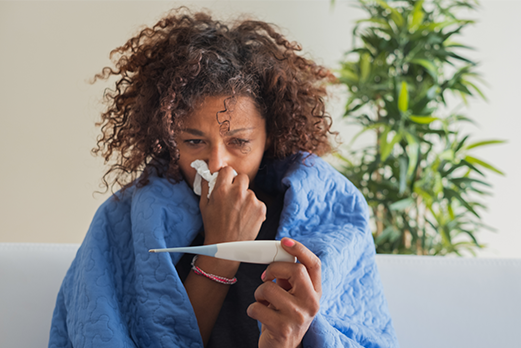
Get Your Flu Shot, Not the Flu
Protect Yourself, Your Family, and Your Community
A flu shot is the best way to lower your risk of getting the flu. But getting the flu shot isn't just about protecting yourself; by getting vaccinated, you're shielding your family, friends, and community from the pain and suffering that the flu can bring. While seasonal flu can be mild, it can also have serious complications, like hospitalizations, and even death. Getting your flu shot is a small step that can make a huge difference in the lives of those you care about.
![]()
As an MVP member, you can get the flu shot anywhere for free (including at our flu shot clinics), but if you get it during a doctor’s visit, you may be charged a co-pay. Be sure to check your plan materials for coverage and deductible details.
Who Should Get a Flu Shot
Everyone six months of age or older should get a flu shot, with some rare exceptions. Flu shots are especially important if you’re in a high-risk group, including people who are:
- Pregnant
- 65 years and older
- Living with chronic conditions like asthma, COPD, or diabetes
Children who are five years old and younger are also considered to be high risk. Learn more about the importance of flu shots for children.


Flu Clinics in Your Community
View Upcoming Community Flu Clinics
|
Date |
Time |
Location |
Registration Info |
|---|---|---|---|
|
Sunday, October 12 |
11 am-2 pm |
Metropolitan Baptist Church |
|
|
Thursday, October 22 |
3-5 pm |
Capital District Latinos - Cultural Empowerment & Community Engagement Center |
Walk-Ins Only – No Registration Required |
|
Thursday, October 25 |
9 am–12 pm |
Saratoga Senior Center |
Vaccine Hesitancy
Although the benefits of flu vaccinations are well-established, myths and misconceptions prevent some individuals from receiving one. Download our Debunking Common Flu Myths flyer.
-
Myth 1: A flu shot can give you the flu.Flu shots don’t cause the flu. Vaccines are made with dead or weakened viruses, or with a single protein from the virus.
-
Myth 2: It’s better to just get the flu.The flu can be serious, particularly for at-risk people. It can cause health complications, hospitalization, or even death.
-
Myth 3: You don’t need an annual flu shot.The Centers for Disease Control recommends an annual flu vaccine. Immunity declines, and a vaccination once a year is the best protection.
Protection, Prevention, All at Once
Vaccines are available to help protect against severe illness caused by major fall and winter respiratory viruses like the flu and RSV. Getting more than one shot at a time can mean fewer trips to the doctor or pharmacy as well as feeling any side effects only once. Consider getting these vaccines at the same time if making multiple visits would be difficult for you.
Healthy Habits for Flu Prevention

- Avoid close contact with people who are sick
- Cover your mouth and nose with a tissue when coughing or sneezing
- Avoid touching your nose, mouth, and eyes
- Get enough sleep, drink plenty of water, and eat well-balanced meals
- Stay home if you’re sick or not feeling well
- Keep your hands clean by frequent washing
- Use an alcohol-based hand sanitizer when you cannot wash
- Keep frequently used surfaces clean

Stay Informed to Stay Healthy
Sign into Gia for additional preventive care recommendations.
